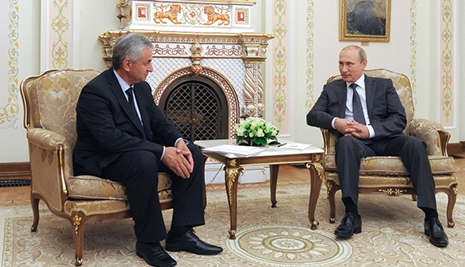The two leaders are expected to sign the Russian-Abkhazian Treaty on Allied Relations and Strategic Partnership, the statement said.
The top-level talks will also touch upon urgent issues of bilateral relations and interaction in the regional security sphere.
On Sunday, Khadzhimba said the signing of the treaty will become “one more step in strengthening our relations with Russia.”
Speaking about advantages provided by the treaty, the Abkhazian leader said: “We have the opportunity to ensure our own long-term security. And we certainly are assuming commitments to ensure the security of our ally - Russia. These are equal relations of two sovereign states.”
Two days before, he also stressed that the treaty underlines Abkhazia’s sovereignty and independence.
On November 20, the Russian government submitted to Putin a proposal to sign the Treaty on Allied Relations and Strategic Partnership with Abkhazia.
The treaty in particular envisions that the Russian Federation “will in all possible ways contribute to strengthening the international ties of the Republic of Abkhazia, including expansion of the range of states that officially recognized it, and creation of conditions for the admission of the Republic of Abkhazia to international organizations and associations, including those established on the initiative and/or with assistance from the Russian Federation.”
The document also says that should one of the sides come under aggression (armed attack) from any state or a group of states, “this will be considered as aggression [armed attack] also against the other State party.” In this case, the sides will grant each other “the necessary assistance, including military, and render support by available means to exercise the right to collective defense.”
The treaty stipulates the establishment of a Joint Group of Forces of the Russian Federation’s Armed Forces and Abkhazia’s Armed Forces to repel aggression. It will be established not later than a year since the treaty’s entry into force.
Russia is to provide funds to modernize Abkhazia’s army not later than three years since the treaty’s coming into force, including stage-by-stage unification of standards of military administration, logistical assistance, monetary allowances and social guarantees of servicemen. Abkhazia’s Armed Forces will also be trained and equipped with modern armaments.
A few points of the document are devoted to guarding of the Abkhazian-Georgian border, whose engineering and technical fitting out is to be completed in two years. The sides are also expected to jointly guard the border. Besides, the treaty stipulates “absolute freedom of crossing of the Russian-Abkhazian state border with account for restrictions established for security reasons.”
In the customs law sphere, Abkhazia will have to harmonize within three years from the treaty’s entry into forces its laws with acts of the Eurasian Economic Union of Russia, Belarus, Kazakhstan and Armenia, and in the part not regulated by the acts - with laws of the Russian Federation. Abkhazia will also have to bring its budget laws closer to Russian ones.
Russia, in line with the document, will “adopt additional measures aimed to streamline procedures to acquire citizenship of the Russian Federation by nationals of the Republic of Abkhazia.”
Russia will also co-finance the raising of wages in Abkhazia “for the key categories of employees of state institutions in the sphere of healthcare, education, science, culture, sports and social servicing of citizens to a level comparable with the wage level of relevant categories of workers in the Southern Federal District of the Russian Federation.”
The same will apply to pensions of Abkhazian residents having Russian citizenship.
The treaty is concluded for 10 years with the possibility to extend it for subsequent five-year periods.
Russia and Georgia cut off diplomatic ties after Russia recognized as independent two Georgian breakaway republics of South Ossetia and Abkhazia. The recognition followed Georgia`s attack on South Ossetia that entailed Russia`s peacemaking operation in August 2008.
More about:















































